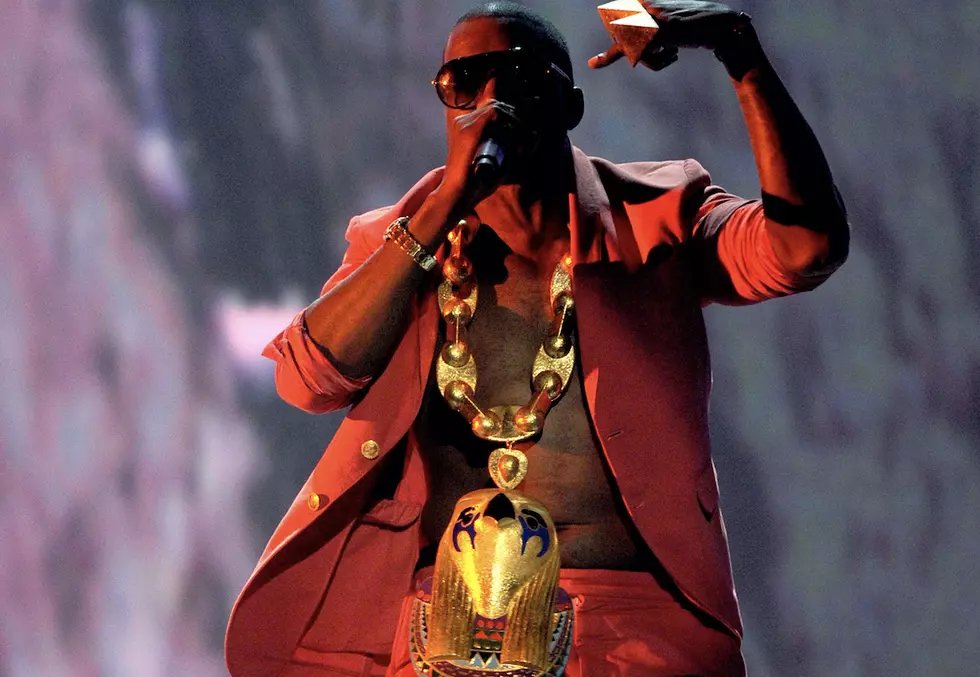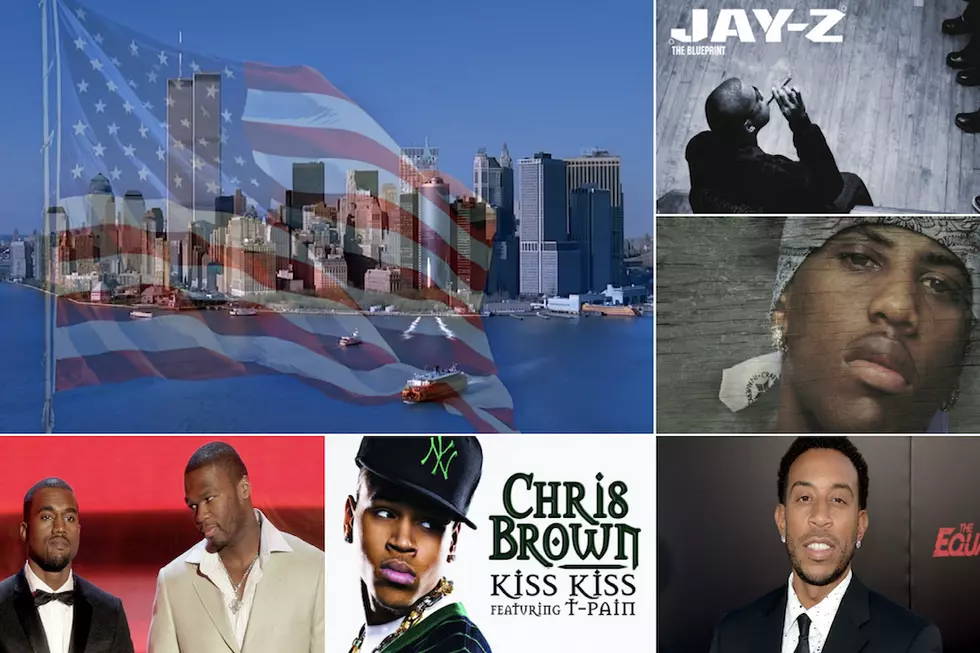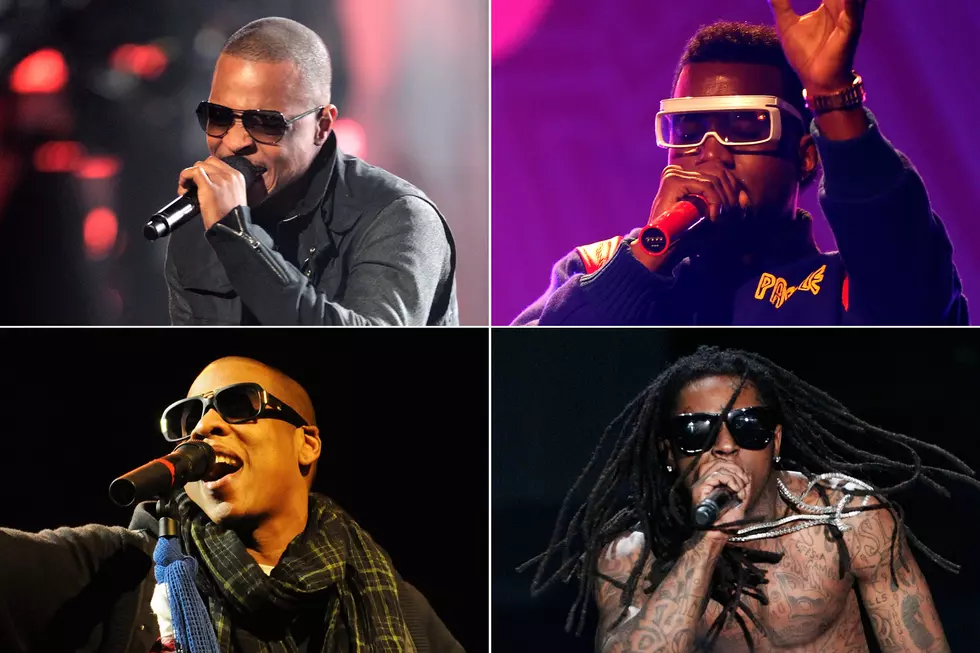![Bilal Talks ‘In Another Life’ Album, Working With Kanye West and Mastering Extreme Yoga [EXCLUSIVE INTERVIEW]](http://townsquare.media/site/625/files/2015/07/bilal-630x420.jpg?w=980&q=75)
Bilal Talks ‘In Another Life’ Album, Working With Kanye West and Mastering Extreme Yoga [EXCLUSIVE INTERVIEW]
The R&B music of today may be missing a bit of the soul that was prevalent in the tunes of yesteryear, but there are still a few artists carrying on tradition. One of those artists is Bilal. The Philadelphia native first burst onto the scene in 2001, with his debut album, 1st Born Second, which included the hit single, "Soul Sista," as well as production (Dr. Dre, Raphael Saadiq) and features (Mos Def, Common) from some of the hottest names in the game.
A number of creative differences with his record label, Interscope, and massive leaks caused for his intended second album, Love for Sale, to be shelved in 2006. The singer's official sophomore LP, Airtight's Revenge, finally arrived in 2010 -- nine years after the release of his first album. He found his footing with that project, a blend of funky, jazzy tunes like "Little One" and "Restart." A Love Surreal following in 2013, which furthered the eclectic crooner's rep for serving up soulful long players. However, there would be another album -- one that didn't bear his name on the cover -- to earn him even more respect in hip-hop circles.
That album was Kendrick Lamar's blockbuster release, To Pimp a Butterfly, which featured the Soulquarian's spacey vocals and unique tenor on the songs "Institutionalized" and "These Walls." Both tracks were fan favorites and essentially introduced him to a new generation of rap lovers that were likely unfamiliar with his brand of music beforehand. Riding high off of that momentum, Bilal brought the spotlight back in his direction with his fourth effort, In Another Life. For the fans just getting acquainted with his catalog, they'll be pleasantly surprised to find collaborations with K. Dot ("Money Over Love") and Big K.R.I.T. ("Pleasure Toy").
We got the chance to chop it up with the ever-smiling Bilal in The Boombox's New York office. Get involved in the conversation as the singer opens up about the state of R&B, his new album, a certain G.O.O.D. rapper he'd love to collaborate with and much more.
The Boombox: Philly is known for being a pretty rough city. What was it like growing up there?
Bilal: I'm from Germantown, so that would be kinda North Philly It was my life, so I guess it was good [laughs], you know what I'm saying. As a kid, you always see the beauty in wherever they are. So you ask any kid that grew in the slums, even in the dark times and you find ways to find light, so I guess that's how my life was. We didn't have the best of everything, but the stuff we did have, we made the best of it.
Philly is also known for having a very big Islamic community. How did growing up in that environment affect you?
It affected me deeply. My father's whole side, the whole side of my father's family are all devout Muslims. In fact, my father's family actually built a mosque in Philly, so our connection to that community is deep. I've grown up going to Claremont Muhammad Masjid. As a kid I can remember going there, spending Ramadan there. So I have that aspect of my life when I was spending with my dad and then I would go to church on Sunday with my mom [laughs]. So I guess I experienced all of that.
Philly is also renowned for breeding soulful musicians. Did living there affect your artistry in any way?
Definitely, Philly really opened me up to my musical side and my soulful side. I grew up actually being raised by the musicians that were from there and still gigging. They would take younger cats and take them under their wing and teach 'em stuff. So I learned from some incredible old heads 'cause of the culture and the way they keep the legacy going.
You linked up with Aaron Comess of The Spin Doctors early in your career. You worked on your demo with him, right?
Yeah, we went to the same college, the New School of Social Research.
Is that in Philly or in New York?
That's here in New York, on 14th and 6th [Avenue]. There's like a jazz conservatory there. Robert Glasper, a big jazz musician, he went there. Me and him were like roommates; we were kinda like running buddies. But the owner of the school would take a lot of students and hire 'em for gigs around the city and we got hired to play this gig at The Sidewalk Cafe early in the morning. Aaron was a drummer. And then randomly we couldn't stay up to make the gig so we started hanging out at his house and it turned out he was hella rich [laughs]. He had a big ass loft and a studio in the basement. So that's where I started to record my demos that I got signed by.
Watch Bilal's "Money Over Love" Video Feat. Kendrick Lamar
How did that time with Aaron translate into the artist that you are today?
Well, before that experience, I really just wanted to be a straight emo vocalist, jazz musician, composer or whatever. But after working with Aaron, I started to like what was happening and seeing different ways that I could make my music kinda reach people of my age bracket. What I was noticing in jazz clubs is it's not my age bracket and I wanted to touch people closer to my age.
Your first album had a slew of memorable producers, including J Dilla and Dr. Dre. How would you say their production styles or recording processes differ?
Their production styles? They both definitely had they own style, but they were similar in that they both ran the studio themselves. Dilla was an incredible engineer and he was an incredible producer. He did everything, he ain't need no one's help in the studio. He could run that ship and Dr. Dre was the same way.
You've worked with The Soulquarians a lot throughout your career, which I kind of compare to the Native Tongues. Were you a fan of that movement?
I was like a little young around that time, but my brothers and my cousins were always watching the videos. I was a real church boy around that time, but they were deep into that thing. Especially Yo! MTV Raps, that was like the thing.
If you had a chance to work with any rapper on an album in the capacity you worked with Kendrick -- past or present -- who would it be?
I would do that with Kanye [West].
Why Kanye in particular?
It's just interesting. It would be cool to do. I know it would be an organic approach, you know what I'm saying. And I like doing that, where it's a very concept-based kinda thing instead of "we just doing a song." I just like cats that's totally into what they do instead of just making songs.
Are there any up-and-coming R&B artists you're feeling or think have the potential to do big things?
I like this group called Hiatus Kaiyote. I like what they're doing.
Where are they from?
They're from Australia.
Are they big in the States or primarily overseas?
I don't know, man. I don't even know what's big [these days].
How did you find out about their music?
Musician friends. Friends just told me about them and my sister's into music so I kinda heard about it like that.
A lot of people say that R&B is far from what it used to be as far as content, style and songs about love. Do you agree with that and how do you feel about the current state of R&B and soul?
Everything goes according to the times and what's going on in the world and back then, the music was geared that way because of the times and what was really going on. People didn't have a lot back then. We as a black people, we didn't really have a lot so we spoke about love and we spoke about real things, as far as compassion and things on a spiritual level. It was a different kind of scope. But now we're successful, so we talk about success and our spiritual drive has turned and kinda shifted in a different way. I'm not here to judge it, but that's what I think it is.
Watch Bilal's "Satellites" Video
What made you name the album In Another Life?
It kinda came random, actually. It's just a lyric out of one of my songs. I got a song on the album, "Satellites," [where I say] it's "just another day in another life" and I'm like "Oh, another life." But then the more I thought about it, it was like really what I'm doing on the album is kind of talking about different subjects from others people's perspectives, putting myself in their shoes and trying to kind of write from that [point of view].
I read you went into this album with a sound more akin to the '60s and '70s. What inspired that?
I wouldn't say it's that. We used a lot of old recording equipment, like the whole album is analog; it's not digitally recorded. So we got all analog tape machines, everything, old '60s mics, ribbon mics and stuff. So the concept with Adrian [Younge] was to use old equipment to make futuristic sounding stuff. Adriane Young is the producer of the album, he produced the record. So we wanted to make something for hip-hop cats that was already made to be sampled, because it sounds like an old dirty record, you know. But it's from the perspective of a hip-hop head. So it's like if a hip-hop producer went back in time.
So you want your music to be the sample, basically.
Right.
How did you hook up with Adrian Younge?
He's like RZA's young boy, like his cat. I met him at a Roots party, a Roots jam session, randomly. A mutual friend introduced us at the Brooklyn Bowl.
Was it during a live show?
They do a giant, well they used to, but I don't know if they still do, but they used to do a giant end of the year party and they would invite a bunch of musicians and everybody would just be there hanging out and then some of the cats would get up and jam with them.
How did the song "Pleasure Toy" with Big K.R.I.T. come about?
I met K.R.I.T. at Raphael Saadiq's studio cause Raphael is like me and Adrian's godfather. Raphael produced my very first hit single -- maybe my only hit single [laughs] -- "Soul Sista," and he's like Adrian's big brother. Raphael still uses reel-to-reel tape. So when we started making tunes, we were like, "Yo, let's go play this for Raphael," and when we got there, he was working with K.R.I.T. So we played our s--- and then they played their stuff and then we got to talking and it worked out. It was a lucky day.
Why did you feel K.R.I.T. would be a good fit for that song?
'Cause of his flow, you know. The song gave me a real nostalgic, throwback, [OutKast's] Southernplayalistic kinda thing, so it just felt right.
You have a song with Kendrick on this album. Did you record that during the time you worked on To Pimp a Butterfly or at another time?
Everything [on In Another Life] was produced by Adrian. So it was just around the same time while I was working on my thing, Kendrick was working on To Pimp a Butterfly, so it was awesome that we were able to jump on each other's projects 'cause we were working with each other at the same time.
How has the response been from your work on To Pimp a Butterfly and how has it affected your career?
That was great. It was great, dude. I've been making music for a long time since my first album came out in 2001, so it kinda really resurged my name into, like, a youthful audience, you know.
What do you think it was about you as an artist that made Kendrick gravitate to you?
I don't know, I paid him [laughs]. But I don't know.
So you never asked him?
When you get certain opportunities, you don't ask why, you just go and take 'em.
What was the hardest song on your album to tackle from a personal level or one that just took a lot out of you emotionally?
This song on there called "Bury Me Next to You." It was like the darkest love song I ever wrote, but isn't that what you want when you meet someone? [laughs]. It's a really dark perspective looking at love.
Were you drawing from a personal experience with that song?
No, dude. I wasn't drawing from nothing. Like, I wrote two poems and then I cut 'em up in pieces and then I pieced them back together.
What was the song you had the most fun recording on the album?
I don't know, they all were fun. "Pleasure Toy" was funny 'cause it started off as a joke and then it turned into the song
Tell me about three songs from the album you're especially eager for fans to hear.
I would say "Star Now," "Bury Me Next to You" and "Lunatic."
What sets In Another Life apart from the other albums in your catalog?
This is the first album that I've ever done that was produced by one producer, so it just has a constant, consistent flow.
What would you say to someone who's never heard of you that may be on the fence about listening to this album?
It's dope. Kendrick Lamar and Big K.R.I.T's on there. That's what I would say. This s---'s hot!
What do you do outside of music to relax these days?
Dude, I like to do workouts. I'm trying to master extreme yoga. Like, I wanna do a f---ing handstand. I wanna just bust that s--- and hold it.
Like Aristotle with all the poses and stuff?
Yeah, I would do that s---. I can kind of do that. I know I can f---ing master that s---.
See 20 Singers' Real Names Revealed
More From TheBoombox









